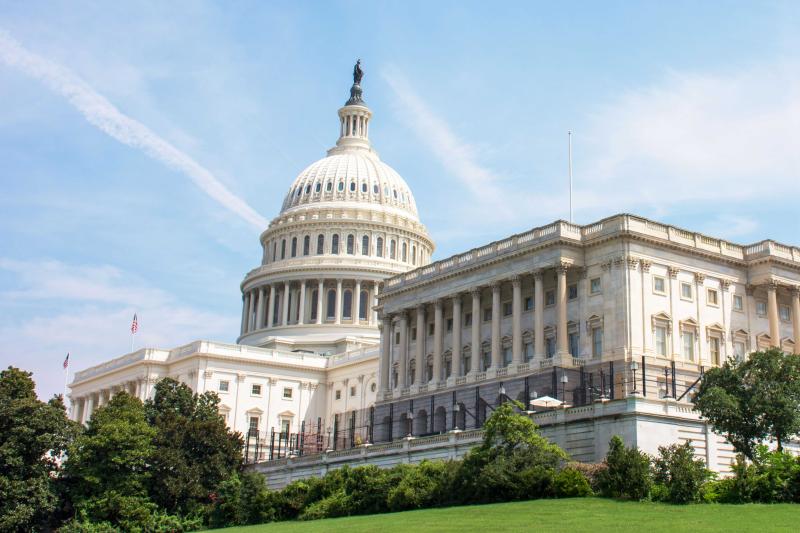Where We Work
See our interactive map


Outside of the Capitol Building in Washington, DC. Photo by Jessica Turner for IntraHealth International.
On Friday, International Nurses Day, Representatives Ami Bera (D-CA-6) and Jen Kiggans (R-VA-2) introduced H. Res. 389, the “Global Frontline Health Worker Resolution,” in the U.S. House of Representatives. IntraHealth International endorses the resolution, which is being championed by CARE USA and the Frontline Health Workers Coalition, an alliance of 42 United States-based and international organizations urging greater US and multilateral investment in health workers.
IntraHealth leads the Frontline Health Workers Coalition Secretariat and commends Rep. Bera, a medical doctor, and Rep. Kiggans, a nurse practitioner, for this strong statement of support for all frontline health workers, and it urges all members of the House to sign on as co-sponsors.
“As trained health workers, Representatives Kiggans and Bera know firsthand how critical frontline health workers–including nurses, midwives, and community health workers–are for ensuring resilient health systems, expanding access to quality health services, and responding to global health security threats,” says Maqsoda Maqsodi, IntraHealth's President and CEO (interim).
“Frontline health workers are the ones that take care of us when we’re sick, when we need a shot, when our children need help. But too often their work is unrecognized and underappreciated,” says Michelle Nunn, president and CEO of CARE USA. “This reality is especially harmful for women, who are 70% of the health workforce and 90% of nurses, yet are frequently unpaid or underpaid for their work. Thousands of health workers lost their lives and countless left their profession over the last few years.”
According to the World Health Organization (WHO) a third of people around the world still do not have access to essential health services such as maternal care, HIV treatment, family planning, and vaccines. One of the greatest threats to reaching universal health coverage is the global shortfall of health workers.
Even before the pandemic we were facing a shortage of 15 million health workers, particularly in Africa. The WHO reports the lack of available health workers was the biggest obstacle to maintaining health services and delivering vaccines during COVID-19.
Nurses make up the majority of the global health workforce, and some estimates show that up to 30 million more nurses and midwives are needed to achieve universal health coverage by 2030.
“There is a shortage of health workers in the public sector in South Sudan. And the health workers who do still work in the sector are overworked, underpaid, and stressed,” says Joice Yari, a nurse in South Sudan working for the USAID-funded and IntraHealth-led Advancing HIV & AIDS Epidemic Control Activity. “When a health worker resigns from their post, it’s hard to quickly replace them, which can cause further staff shortages and interrupt HIV treatment for clients.”
“This important Congressional resolution moves us toward recognizing the indispensable contributions and tireless sacrifices of this workforce,” says Nunn. “When frontline health workers—including community health workers—are fairly paid, trained, protected, and supported, health systems work better and can withstand shocks like pandemics. Most importantly, everyone’s health improves.”
The Coalition, its member organizations, and other health workforce advocates are working to secure additional, dedicated US investment and gender-responsive policies to support and protect health workers. This includes urging Congress to provide at least $200 million in Fiscal Year 2024 to appropriately fund the US Global Health Workforce Initiative.
The full text of the resolution is available here.
The resolution is endorsed by Action Against Hunger, American Heart Association, Amref Health Africa, AVAC, CARE USA, Children’s AIDS Fund International, CORE Group, Elizabeth Glaser Pediatric AIDS Foundation, Friends of the Global Fight, Frontline Health Workers Coalition, G4 Alliance, GAIA Global Health, Global Health Council, Housing Works, Inc., ICAP at Columbia University, Integrate Health, IntraHealth International, Jhpiego, Johnson & Johnson, Management Sciences for Health, mothers2mothers, Muso, ONE, Operation Smile, PAI, PATH, Pathfinder, Project HOPE, Research!America, RESULTS, RTI International, Sabin Vaccine Institute, Seed Global Health, Smile Train, The Hunger Project, THINKMD, Training for Health Equity Network: THEnet, UNICEF USA, United to Beat Malaria, VillageReach, WaterAid America, Women Deliver, World Bicycle Relief, World Vision US.
This article is based on the post published on the Frontline Health Workers Coalition blog authored by Carol Bales of IntraHealth and Corinne Paul of CARE USA.



